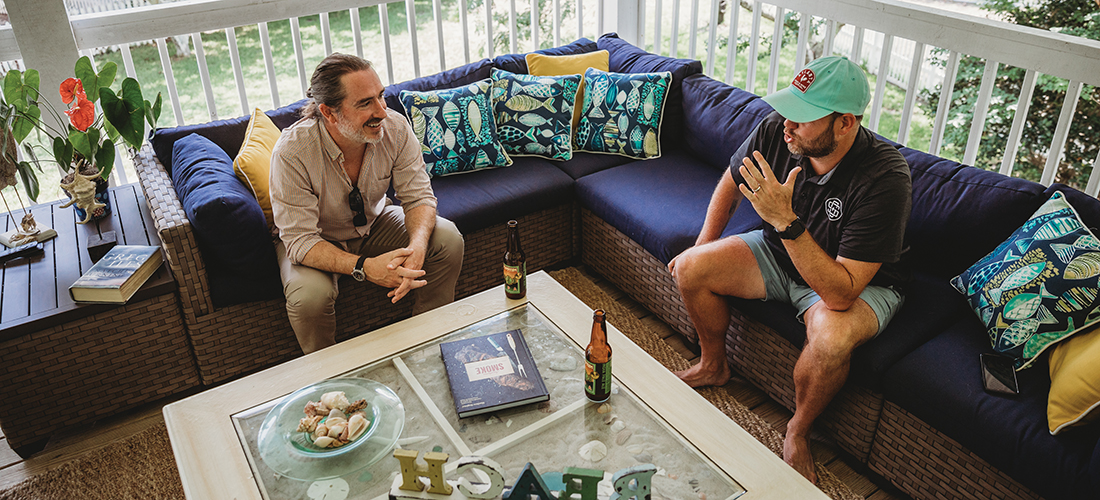Glowing Results
The mission of Girls Leadership Academy of Wilmington is to prepare young women to be the first in their families to attend college. The task starts early
By Dana Sachs
Jahleese Hadley, college-bound counselor at GLOW (Girls Leadership Academy of Wilmington), an all-girls charter school designed especially for students who will be the first in their families to attend college. GLOW is welcoming students at its new campus in Wilmington this fall.
GLOW enrolled its first class of sixth-graders in 2016. You’ve added a new class every year, with the oldest now starting ninth grade. Why do these young students need a college counselor? College is so far away.
It is, but our goal is that these girls will be college-ready when they graduate. The vast majority of students who go to college in this country have some identity around being a college-going person. Many of our girls don’t have that, so we start in sixth grade to begin to build that culture. We don’t want these girls to see high school as the pinnacle of their education.
So you’re trying to instill the idea of continuing after graduation?
Absolutely. GLOW is part of a national alliance, Young Women’s Leadership Network. I went to the network’s flagship school, in Harlem. The college-going culture there was so pervasive that, when I graduated and people congratulated me for planning to go to college, I was thinking, “But what else was I going to do?” Graduating from high school and going to college was what I understood the path to be.
And that sense of continuing came from the school, not from your family background?
I grew up in a household with one parent working. That parent was under-educated, but she did the absolute best she could. She provided for us just fine, but I realize how little we had and how little she was able to give me in the way of setting me up for the path that I’m on now. I came from a family that was working poor, and in order to escape that, I needed to be upwardly mobile. So the school really was a game-changer for me.
Why did you decide to go to that school?
So, middle school at that time started in seventh grade in New York. When I was in sixth grade, my mom said, “There’s a school, it’s three blocks from your school” — I was going to a gifted school at the time — “and it’s an all-girls school and you have to wear a uniform.” And I am such a dork that that was all I needed.
You liked the idea of a uniform?
I liked the idea of going somewhere different. Actually, I already went to a school with a uniform, but then I saw this school’s uniform. It was a plaid wool skirt. And you had to wear something with the emblem on it — a blazer or a pullover sweater vest or a bolero.
Very preppy.
It felt preppy! And different. And then I went to visit. All the walls were pink and blue. The classrooms had lots of light. And it just felt very special.
Now that you’re in the administration of one of these schools, how do you identify which students have a good chance of success?
It’s about identifying families who are motivated to be there. The principal of my school in New York later told me that he listened for kids saying that they were genuinely interested in the school. Or their parents articulated their vision for their kids’ success. Those are the things that determine who is going to make it through the program. Not necessarily how smart kids are.
It sounds like parents play a fundamental role.
There is buy-in. At GLOW, a nice portion of our parent community is very invested in our success. They aren’t just interested in encouraging us, and being here to assist with the work, but also in challenging that work to make it better, which is what we need.
Can you give an example of how parents might challenge you?
A problem in every school — and we are not immune to it — is that kids in the middle don’t get as much attention. They’re not the most high-achieving. They’re not super-struggling. We have to take the time to intentionally meet their needs. It’s really important for us to be reminded of that, and for our parents to know that we don’t want their kids to just skate on by.
So this is the kind of thing that parents have pointed out to you?
Yeah. And usually it has to do specifically with their kids.
It becomes a partnership, then, between the parents and the school.
In an ideal world, yes. It’s not always the case, but that’s what we want.
In addition to counseling the kids, you helped start a culinary program at the school. What was the purpose of that?
I’m a baker. That’s just something that I do. When I came to GLOW, we were trying to figure out what I was going to do with sixth-graders. How am I going to build relationships with these kids? I said, “I’m going to teach a cooking class.” So we did quite a bit of baking. We made cookies. We learned to make biscuit dough. A lot of sugary stuff. And then the adults were like, “Can they learn to work with vegetables, please?” So, we learned to make hummus. Guacamole. The agreement was, “You try everything we make.”
How did they react to hummus?
Like sixth-graders: “Ew! I’m not eating that.” And I’d say, “The agreement is you’re going to take a bite.” Half of them liked it. When kids say, “I tried it and I still don’t like it,” I say, “You know what you like and don’t like.” Kids who are willing to take risks are going to access more things in the future. My job is to push you to do it and to catch you if you fall. Or, to tell you it’s all right if you still hate it, and not shame you. That’s important to their development, too.
GLOW’s student body is around 57 percent black. As an African- American woman yourself, do you see yourself as a role model for those girls?
I understand the impact that I can have. It’s very natural to gravitate toward people who have the same experiences as you, but if they limit themselves to that, they are going to miss out on opportunities. So I understand that my black students might look at me in a different way than my white or Latina students, but I want them all to feel like they can talk to me, and that they all have a sense of comfort with me.
Would you encourage these girls to come back to Wilmington after college and build their careers here?
I don’t have to encourage our girls to come back to Wilmington. Students who benefit from public service feel drawn back to their home communities or to communities like them. The majority want to help other people. I don’t think this needs to be a conversation: “Once you make it, girls, come back to Wilmington and fix this place.” This is their community.
Dana Sachs’ latest novel, The Secret of the Nightingale Palace, is available at bookstores, online and throughout Wilmington.


